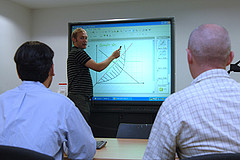Federal Reg Updates: Teacher Prep, Ratings System, TEACH Act, & Net Neutrality
Published by: WCET | 2/4/2015
Tags: Assessment, Completion, Financial Aid, K-12, Outcomes, Regulation, Teaching, Title IV, U.S. Department Of Education
Published by: WCET | 2/4/2015
Tags: Assessment, Completion, Financial Aid, K-12, Outcomes, Regulation, Teaching, Title IV, U.S. Department Of Education
Last week’s blog post looked forward to the likely reauthorization this year of The Higher Education Act, the “major law that authorizes the federal programs that support colleges and universities and their students, most significantly the federal student loan and grant programs.”
Meanwhile, there are several other laws and regulations that are currently in play. With the help of EDUCAUSE’s Jarret Cummings, we’ll update you on proposed new regulations of interest to the technology-mediated instruction community. Update include the teacher preparatory programs, the Postsecondary Institutional Ratings System, the new TEACH Act (focusing on accessibility requirements), and Net Neutrality.
Teacher Preparation Program Accountability

The Online Learning Consortium (OLC), University Professional and Continuing Education Association (UPCEA), and WCET jointly submitted a letter expressing our concerns with the proposed regulations for states to oversee teacher preparation programs. We especially focused on the concerns for teacher education programs offered at a distance. Our objections (which we initially identified in a post last December) included:
We also provide five recommendations on how the Department of Education might address these concerns.
We at WCET express our gratitude to those at OLC, UPCEA, the President’s Forum, and the United States Distance Learning Association for co-signing the letter. We’re stronger together.
Postsecondary Institutional Ratings System
The Department of Education is also seeking comment on its proposed rating system that will be used for at the following purposes (taken from the College Ratings website):
While there is more details about what is being proposed, there is much work to be done. The document for comment includes several questions that they are seeking to answer.
The greatest short-term concern for those who serve non-traditional students is the IPEDS completion rate, which (until now) focused only on first-time, full-time students. Transfer students and those enrolling part-time were excluded from the counts. While those students are now being included, the first results from that inclusion will not be available until 2017 (see page 10). There’s one huge problem with this, version 1.0 of the ratings will be released prior to the 2015/15 school year (see page 2). Why are they releasing results prior to having accurate data on one of the most important outcomes measures?
We urge you to comment:
“The Department welcomes comments until February 17, 2015 on the approaches and specific questions outlined in this document either publicly through the comment section of the Department’s higher education blog or by email to collegefeedback@ed.gov”
TEACH Act Compromise Efforts Ongoing

The National Federation of the Blind (NFB) and the Association of American Publishers (AAP) worked with members of Congress last year to introduce the Technology, Equality and Accessibility in College and Higher Education Act (TEACH Act). The bill proposed to foster the development of voluntary guidelines for “electronic instructional materials and related technologies.” Many higher education associations support this goal, believing that voluntary guidelines could help colleges and universities continue to improve in meeting the learning needs of students with disabilities. However, they have concerns that the bill as written would unintentionally hamper the use of technology to advance learning by all students, including those with disabilities. At a meeting last October, NFB and AAP agreed to work with the American Council on Education (ACE), EDUCAUSE, and others to develop a new legislative proposal for creating voluntary guidelines that would avoid the pitfalls of the previous bill. The groups have worked since then on a shared concept outline for a bill. A few outstanding issues remain, but once those are resolved, the participating groups will move to draft the compromise bill itself, with the goal of introducing it for the Higher Education Act reauthorization process set to start later this year
Network Neutrality Process Far From Over
As the Federal Communications Commission (FCC) neared the release of new network neutrality rules last fall, President Obama publicly advocated that the FCC reclassify commercial Internet access services as “telecommunications services” under Title II of the Communications Act of 1934. This would clearly establish the FCC’s authority to create network neutrality rules after federal courts had overturned previous efforts. However, it would carry with it a host of provisions developed over decades largely to cover “plain old telephone service” with utility-style regulation. Critics are concerned about the FCC’s ability to appropriately determine what and what not to apply from the Title II legacy. They believe that the FCC should use its more flexible authority under Section 706 of the Telecommunications Act of 1996 to craft rules without “stifling innovation with the heavy hand of government.”
Many believe that the President’s announcement has pushed the FCC to take the Title II route, which should become apparent when the FCC chairman shares draft rules with the rest of the Commission on Feb. 5. The commissioners will then vote on the proposed rules at a scheduled Feb. 26th meeting, which FCC watchers believe will produce a 3-2, party-line vote for adoption. The telecommunications industry has made it very clear, though, that it will challenge Title II reclassification in court while also working with Congress to overturn any FCC action along those lines. The relevant committees in the House and Senate have already released a draft bill for discussion. It would create a new section of the Communications Act to establish network neutrality rules while preventing Title II regulation of ISPs. It is unclear whether Congress can pass a bill of this type, or whether such a bill could survive a presidential veto. So, it will likely be later this spring before we know what action, if any, Congress can take on network neutrality. And if the FCC’s rules clear that hurdle, we will have to wait for the courts to determine if the FCC finally has a formula that can withstand legal challenge as well.
Thank You, Stay Tuned, and Get Involved
Again, a big thank you to Jarret Cummings of EDUCAUSE for his great work on the TEACH Act (we’re indebted to him on this) and on Net Neutrality.
Keep watching for updates and get involved. The more comments, input, and influence that we can assert from multiple sources, the better off we will be.
Thank you for your participation.
Russell Poulin
Deputy Director, Research & Analysis
WCET – WICHE Cooperative for Educational Technologies
rpoulin@wiche.edu
Twitter: wcet_info and RussPoulin
Photo credits: Smartboard by Jisc – https://www.flickr.com/photos/jiscimages/436456433
If you like what we do and you’re not a member…join us!